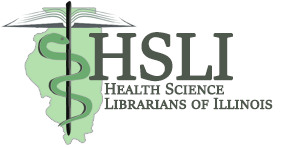I also wanted to share my interview with HSLI President Stacey Knight-Davis that appeared in the Spring edition. (Again, sorry I’m sending this out just now.) Thanks, again, Stacey, for agreeing to be interviewed!
Member Spotlight: Stacey Knight-Davis
Why did you decide to become a librarian?
I started volunteering at my local public library when I was in grade school, and I worked there as a clerk while I was in high school. Since I already had experience, I worked as a student in Central Circulation at UIUC as an undergraduate biology student. One day I was checking in a bound volume of the Bulletin of the Medical Library Association and thought, “Huh. Guess I don’t have to choose between biology and libraries.”
What do you find most rewarding about your work with the Health Science Librarians of Illinois, including currently serving as President?
Helping people find each other. Whatever problem or question an HSLI member might have, the HSLI community is available to offer help. I encourage all academic librarians to consider joining HSLI-you don’t have to work in a medical library, any librarian that wants to connect his or her library’s users with reliable health information is welcome. As HSLI President, I’ve been able to connect HSLI with other organizations. I have enjoyed working with the IACRL Conference Planning Committee to arrange the “Measuring What Matters to Stakeholders” preconference.
If you could use one word to describe librarianship today, what would that word be?
Connected. We all need to strive to be connected. And while technology may be your first though on hearing that word, I want everyone to think about personal connections first instead. Get connected with your library’s users. Your stakeholders. Your colleagues. Your community. Though connections, we will survive and thrive.
What do you think is the biggest misconception people have about libraries in general?
I think many students see libraries as a self-service warehouse. They don’t ask for help, because they don’t think they should need help. The same students wouldn’t walk into the laboratory or studio on the first day of class and expect to be able to do something perfectly on the first try without the professor’s help. But for some reason, some students think should be able to navigate the entire body of scholarly knowledge by themselves. I want students to see the librarian as another teacher. I want students to think of the library as an extension of the classroom, lab, or studio. The library is a place of teaching and learning, not a warehouse.
�Where do you see the profession being in 10 years?
We will still be here helping people in ten years; the resources will just be a little different. I think e-books will come of age by 2024. Along with the increased reliance on electronic materials will come in increase in the faculty’s awareness of licensing and open access. Librarians will help students and faculty navigate the options for publishing their work in institutional repositories and other open-access venues.
